- Home
- Margaret Atwood
Stone Mattress
Stone Mattress Read online
ALSO BY MARGARET ATWOOD
NOVELS
The Edible Woman
Surfacing
Lady Oracle
Life Before Man
Bodily Harm
The Handmaid’s Tale
Cat’s Eye
The Robber Bride
Alias Grace
The Blind Assassin
Oryx and Crake
The Penelopiad
The Year of the Flood
MaddAddam
SHORTER FICTION
Dancing Girls
Murder in the Dark
Bluebeard’s Egg
Wilderness Tips
Good Bones
Good Bones and Simple Murders
The Tent
Moral Disorder
POETRY
Double Persephone
The Circle Game
The Animals in That Country
The Journals of Susanna Moodie
Procedures for Underground
Power Politics
You Are Happy
Selected Poems: 1965–1975
Two-Headed Poems
True Stories
Interlunar
Selected Poems II: Poems Selected and New, 1976–1986
Morning in the Burned House
Eating Fire: Selected Poetry, 1965–1995
The Door
NONFICTION
Survival: A Thematic Guide to Canadian Literature
Days of the Rebels 1815–1840
Second Words
Strange Things: The Malevolent North in Canadian Literature
Negotiating with the Dead: A Writer on Writing
Moving Targets: Writing with Intent 1982–2004
Curious Pursuits: Occasional Writing
Writing with Intent: Essays, Reviews, Personal Prose 1983–2005
Payback: Debt and the Shadow Side of Wealth
In Other Worlds: SF and the Human Imagination
FOR CHILDREN
Up in the Tree
Anna’s Pet (with Joyce Barkhouse)
For the Birds
Princess Prunella and the Purple Peanut
Rude Ramsay and the Roaring Radishes
Bashful Bob and Doleful Dorinda
Wandering Wenda
Copyright © 2014 O.W. Toad, Ltd.
All rights reserved. The use of any part of this publication reproduced, transmitted in any form or by any means, electronic, mechanical, photocopying, recording, or otherwise, or stored in a retrieval system, without the prior written consent of the publisher — or, in case of photocopying or other reprographic copying, a licence from the Canadian Copyright Licensing Agency — is an infringement of the copyright law.
Library and Archives of Canada Cataloguing in Publication is available upon request.
ISBN: 978-0-7710-0680-7
ebook ISBN: 978-0-7710-0682-1
This is a collection of individual works, not a unified text.
“Fair Use” is not a licence to reproduce whole stories without permission of the copyright holder.
This book is a work of fiction. Names, characters, businesses, organizations, places, events, and incidents either are the product of the author’s imagination or are used fictitiously. Any resemblance to actual persons, living or dead, events, or locales is entirely coincidental.
McClelland & Stewart,
a division of Random House of Canada Limited,
a Penguin Random House Company
www.randomhouse.ca
v3.1
CONTENTS
Cover
Other Books by This Author
Title Page
Copyright
Alphinland
Revenant
Dark Lady
Lusus Naturae
The Freeze-Dried Groom
I Dream of Zenia with the Bright Red Teeth
The Dead Hand Loves You
Stone Mattress
Torching the Dusties
Acknowledgements
A Note About the Author
Reading Group Guide
ALPHINLAND
The freezing rain sifts down, handfuls of shining rice thrown by some unseen celebrant. Wherever it hits, it crystallizes into a granulated coating of ice. Under the streetlights it looks so beautiful: like fairy silver, thinks Constance. But then, she would think that; she’s far too prone to enchantment. The beauty is an illusion, and also a warning: there’s a dark side to beauty, as with poisonous butterflies. She ought to be considering the dangers, the hazards, the grief this ice storm is going to bring to many; is already bringing, according to the television news.
The TV screen is a flat high-definition one that Ewan bought so he could watch hockey and football games on it. Constance would rather have the old fuzzy one back, with its strangely orange people and its habit of rippling and fading: there are some things that do not fare well in high definition. She resents the pores, the wrinkles, the nose hairs, the impossibly whitened teeth shoved right up in front of your eyes so you can’t ignore them the way you would in real life. It’s like being forced to act as someone else’s bathroom mirror, the magnifying kind: seldom a happy experience, those mirrors.
Luckily, on the weather show the personnel stand well back. They have their maps to attend to, their broad hand gestures, like those of waiters in glamorous films of the ’30s or magicians about to reveal the floating lady. Behold! Gigantic swaths of whiteness plume across the continent! Just look at the extent of it!
Now the show moves outside. Two young commentators – a boy, a girl, both of them wearing stylish black parkas with halos of pale fur around their faces – hunch under dripping umbrellas as cars grind slowly past them, windshield wipers labouring. They’re excited; they say they’ve never seen anything like it. Of course they haven’t, they’re too young. Next there are shots of calamities: a multiple car-crash pileup, a fallen tree that’s bashed off part of a house, a snarl of electrical wires dragged down by the weight of the ice and flickering balefully, a row of sleet-covered planes stranded in an airport, a huge truck that’s jackknifed and tipped over and is lying on its side with smoke coming out. An ambulance is on the scene, a fire truck, a huddle of raingear-clad operatives: someone’s been injured, always a sight to make the heart beat faster. A policeman appears, crystals of ice whitening his moustache; he pleads sternly with people to stay inside. It’s no joke, he tells the viewers. Don’t think you can brave the elements! His frowning, frosted eyebrows are noble, like those on the wartime bond-drive posters from the 1940s. Constance remembers those, or believes she does. But she may just be remembering history books or museum displays or documentary films: so hard, sometimes, to tag those memories accurately.
Finally, a minor touch of pathos: a stray dog is displayed, semi-frozen, wrapped in a child’s pink nap blanket. A gelid baby would have been better, but for lack of one the dog will do. The two young commentators make Aw cute faces; the girl pats the dog, which wags its sodden tail feebly. “Lucky guy,” says the boy. This could be you, it’s implied, if you don’t behave yourself, only you wouldn’t get rescued. The boy turns to the camera and solemnifies his face, even though it’s clear he’s having the time of his life. There’s more to come, he says, because the main part of the storm hasn’t even hit! It’s worse in Chicago, as it so often is. Stay tuned!
Constance turns off the TV. She crosses the room, dims the lamp, then sits beside the front window, staring out into the streetlight-illuminated darkness, watching the world turn to diamonds – branches, rooftops, hydro lines, all glittering and sparkling.
“Alphinland,” she says out loud.
“You’ll need salt,” says Ewan, right in her ear. The first time he spoke to her it startled and even alarmed her – Ewan h
aving been no longer in a tangibly living condition for at least four days – but now she’s more relaxed about him, unpredictable though he is. It’s wonderful to hear his voice, even if she can’t depend on having any sort of a conversation with him. His interventions tend to be one-sided: if she answers him, he doesn’t often answer back. But it was always more or less like that between them.
She hadn’t known what to do with his clothes, afterwards. At first she left them hanging in the closet, but it was too upsetting to open the door and see the jackets and suits ranged on their hangers, waiting mutely for Ewan’s body to be slipped inside them so they could be taken for a walk. The tweeds, the woollen sweaters, the plaid work shirts … She couldn’t give them away to the poor, which would have been the sensible thing. She couldn’t throw them out: that would have been not only wasteful but too abrupt, like ripping off a bandage. So she’d folded them up and stored them away in a trunk on the third floor, with mothballs.
That’s fine in the daytimes. Ewan doesn’t seem to mind, and his voice, when it turns up, is firm and cheerful. A striding voice, showing the way. An extended index-finger voice, pointing. Go here, buy this, do that! A slightly mocking voice, teasing, making light: that was often his manner towards her before he became ill.
At night, however, things get more complex. There have been bad dreams: sobbing from inside the trunk, mournful complaints, pleas to be let out. Strange men appearing at the front door who hold out promises of being Ewan, but who are not. Instead they’re menacing, with black trench coats. They demand some garbled thing that Constance can’t make out, or, worse, they insist on seeing Ewan, shouldering their way past her, their intentions clearly murderous. “Ewan’s not home,” she’ll plead, despite the muted cries for help coming from the trunk on the third floor. As they begin to tromple up the stairs, she wakes up.
She’s considered sleeping pills, though she knows they’re addictive and lead to insomnia. Maybe she ought to sell the house and move to a condo. That notion was being pushed at the time of the funeral by the boys, who are not boys any more and who live in cities in New Zealand and France, too conveniently far for them to visit her much. They’d been backed up in spades by their brisk but tactful and professionally accomplished wives, the plastic surgeon and the chartered accountant, so it was four against one. But Constance stood firm. She can’t abandon the house, because Ewan is in it. Though she’d been smart enough not to tell them about that. They’ve always thought she was slightly borderline anyway because of Alphinland, though once such an enterprise makes a lot of money the whiff of nuttiness around it tends to evaporate.
Condo is a euphemism for retirement home. Constance doesn’t hold it against them: they want what is best for her, not merely what is simplest for them, and they were understandably perturbed by the disorder they’d witnessed, both in Constance – though they’d made allowances because she was in the throes of mourning – and in, just for example, her refrigerator. There were items in that refrigerator for which there was no sane explanation. What a swamp, she could hear them thinking. Awash in botulism, a wonder she hasn’t made herself seriously ill. But of course she hadn’t, because she wasn’t eating much in those final days. Soda crackers, cheese slices, peanut butter straight from the jar.
The wives had dealt with the situation in the kindest way. “Do you want this? What about this?” “No, no,” Constance had wailed. “I don’t want any of it! Throw it all out!” The three little grandchildren, two girls and a boy, had been sent on a sort of Easter egg hunt, searching for the half-drunk cups of tea and cocoa that Constance had left here and there around the house and that were now covered with grey or pale-green skins in various stages of growth. “Look, Maman! I found another one!” “Ew, that’s gross!” “Where is Grandpa?”
A retirement home would provide company for her, at least. And it would take away the burden from her, the responsibility, because a house like hers needs upkeep, it needs attention, and why should she be saddled with all those chores any more? That was the idea set forth in some detail by the daughters-in-law. Constance could take up bridge-playing, or Scrabble, they suggested. Or backgammon, said to be popular again. Nothing too stressful or exciting to the brain. Some mild communal game.
“Not yet,” says Ewan’s voice. “You don’t need to do that yet.”
Constance knows this voice isn’t real. She knows Ewan is dead. Of course she knows that! Other people – other recently bereaved people – have had the same experience, or close. Aural hallucination, it’s called. She’s read about it. It’s normal. She isn’t crazy.
“You’re not crazy,” Ewan says comfortingly. He can be so tender when he thinks she’s having some anguish.
He’s right about the salt. She ought to have stocked up on some form of ice melt earlier in the week but she forgot, and now if she doesn’t get some, she’ll be a prisoner inside her own house because the street will be a skating rink by tomorrow. What if the layer of ice doesn’t melt for days and days? She could run out of food. She could become one of those statistics – old recluse, hypothermia, starvation – because, as Ewan has pointed out before now, she can’t live on air.
She’ll have to venture out. Even one bag of salt mix will be enough to do the steps and the walk and keep other people from killing themselves, much less herself. The corner store is her best bet: it’s only two blocks away. She’ll have to take her two-wheeled shopping bag, which is red and also waterproof, because the salt will be heavy. It was only Ewan who drove their car; her own licence lapsed decades ago because once she got so deeply involved in Alphinland she felt she was too distracted to drive. Alphinland requires a lot of thought. It excludes peripheral details, such as stop signs.
It must be quite slippery out there already. If she tries this escapade, she might break her neck. She stands in the kitchen, dithering. “Ewan, what should I do?” she says.
“Pull yourself together,” Ewan says firmly. Which isn’t very instructive, but which was his habitual way of responding to a question when he didn’t want to be pinned down. Where’ve you been, I was so worried, did you have an accident? Pull yourself together. Do you really love me? Pull yourself together. Are you having an affair?
After some rummaging, she finds a large zip-lock freezer bag in the kitchen, dumps out the three shrivelled, whiskery carrots inside it, and fills it with ashes from the fireplace, using the little brass fireplace shovel. She hasn’t lit a fire since Ewan ceased to be present in visible form, because it didn’t seem right. Lighting a fire is an act of renewal, of beginning, and she doesn’t want to begin, she wants to continue. No: she wants to go back.
There’s still a stack of wood and some kindling; there are still a couple of partially burnt logs in the grate from the last fire they had together. Ewan was lying on the sofa with a glass of that disgusting chocolate nutrient drink beside him; he was bald, due to the chemo and the radiation. She tucked the plaid car rug around him and sat beside him, holding his hand, with the tears running silently down her cheeks and her head turned away so he couldn’t see. He didn’t need to be distressed by her distress.
“This is nice,” he’d managed to say. It was hard for him to talk: his voice was so thin, like the rest of him. But that isn’t the voice he has now. The voice he has now is back to normal: it’s his voice of twenty years ago, deep and resonant, especially when he laughs.
She puts on her coat and boots, finds her mittens and one of her woolly hats. Money, she’ll need some of that. House keys: it would be stupid to lock herself out and be turned into a frozen lump right on her own doorstep. When she’s at the front door with the wheeled shopping bag, Ewan says to her, “Take the flashlight,” so she trudges upstairs to the bedroom in her boots. The flashlight is on the nightstand on his side of the bed; she adds it to her purse. Ewan is so good at planning ahead. She herself never would have thought of a flashlight.
The front porch steps are sheer ice already. She sprinkles ashes on them from the zip-lock, t
hen stuffs the bag into her pocket and proceeds down crabwise, one step at a time, holding on to the railing and hauling the wheeled shopper behind her with the other hand, bump bump bump. Once on the sidewalk, she opens the umbrella, but that’s not going to work – she can’t manage those two objects at once – so she closes it again. She’ll use it as a cane. She inches out onto the street – it’s not as icy as the sidewalk – and teeters along the middle of it, balancing herself with the umbrella. There aren’t any cars, so at least she won’t get run over.
On the especially sheer parts of the road she sprinkles more of the ashes, leaving a faint black trail. Perhaps she’ll be able to follow it home, if push comes to shove. It’s the kind of thing that might occur in Alphinland – a trail of black ashes, mysterious, alluring, like glowing white stones in a forest, or bread crumbs – only there would be something extra about those ashes. Something you’d need to know about them, some verse or phrase to pronounce in order to keep their no doubt malevolent power at bay. Nothing about dust to dust, however; nothing involving last rites. More like a sort of runic charm.
“Ashes, bashes, crashes, dashes, gnashes, mashes, splashes,” she says out loud as she picks her way over the ice. Quite a few words rhyme with ashes. She’ll have to incorporate the ashes into the storyline, or one of the storylines: Alphinland is multiple in that respect. Milzreth of the Red Hand is the most likely provenance for those spellbinding ashes, being a warped and devious bully. He likes to delude travellers with mind-altering visions, lure them off the true path, lock them into iron cages or shackle them to the wall with gold chains, then pester them, using Hairy Hank-Imps and Cyanoreens and Firepiggles and whatnot. He likes to watch as their clothing – their silken robes, their embroidered vestments, their fur-lined capes, their shining veils – are ripped to shreds, and they plead and writhe attractively. She can work on the intricacies of all that when she gets back to the house.

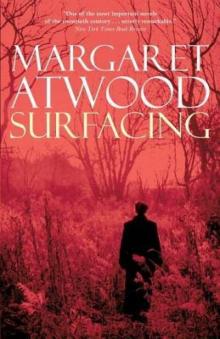 Surfacing
Surfacing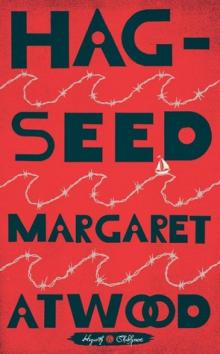 Hag-Seed
Hag-Seed Oryx and Crake
Oryx and Crake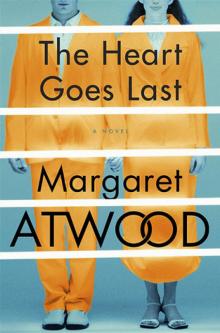 The Heart Goes Last
The Heart Goes Last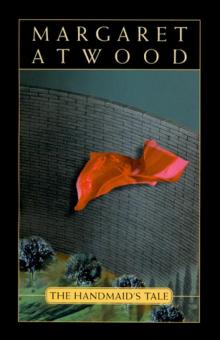 The Handmaid's Tale
The Handmaid's Tale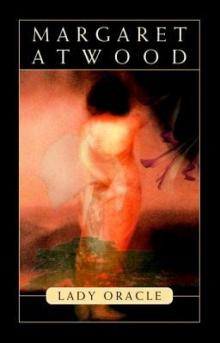 Lady Oracle
Lady Oracle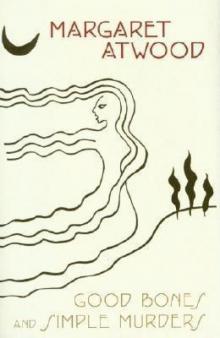 Good Bones and Simple Murders
Good Bones and Simple Murders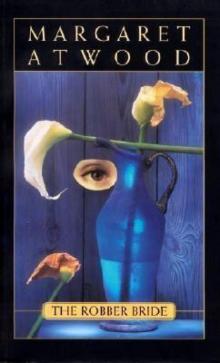 The Robber Bride
The Robber Bride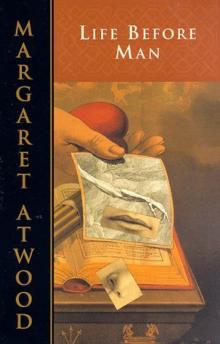 Life Before Man
Life Before Man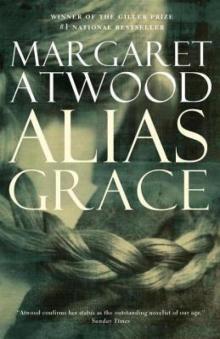 Alias Grace
Alias Grace The Blind Assassin
The Blind Assassin Cat's Eye
Cat's Eye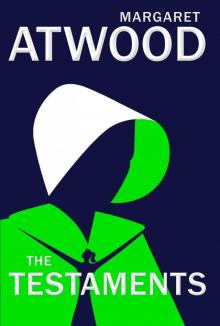 The Testaments
The Testaments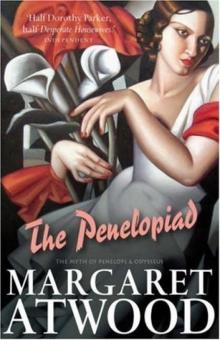 The Penelopiad
The Penelopiad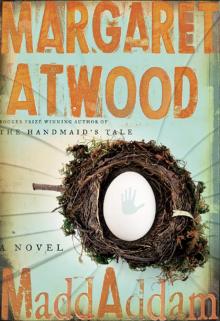 MaddAddam
MaddAddam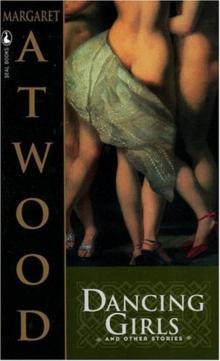 Dancing Girls & Other Stories
Dancing Girls & Other Stories On Writers and Writing
On Writers and Writing Selected Poems II (1976-1986)
Selected Poems II (1976-1986) Wilderness Tips
Wilderness Tips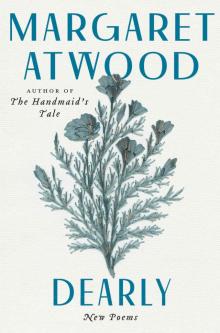 Dearly
Dearly The Tent
The Tent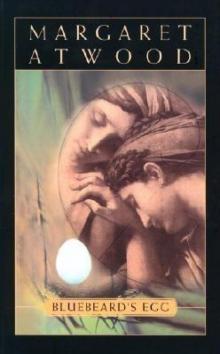 Bluebeard's Egg
Bluebeard's Egg The Edible Woman
The Edible Woman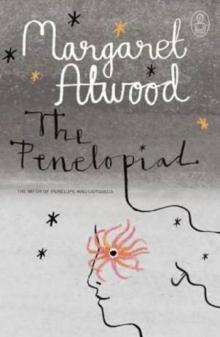 The Penelopiad: The Myth of Penelope and Odysseus
The Penelopiad: The Myth of Penelope and Odysseus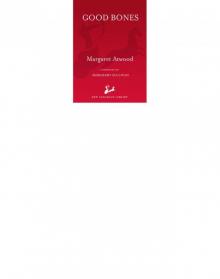 Good Bones
Good Bones I Dream of Zenia with the Bright Red Teeth
I Dream of Zenia with the Bright Red Teeth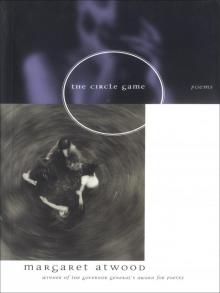 Circle Game
Circle Game Choke Collar: Positron, Episode Two
Choke Collar: Positron, Episode Two Stone Mattress: Nine Tales
Stone Mattress: Nine Tales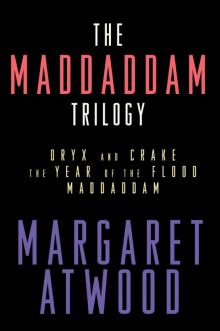 The MaddAddam Trilogy
The MaddAddam Trilogy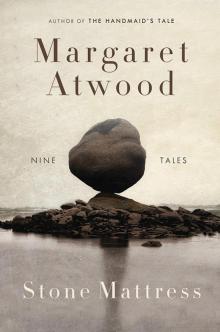 Stone Mattress
Stone Mattress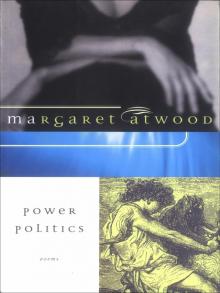 Power Politics
Power Politics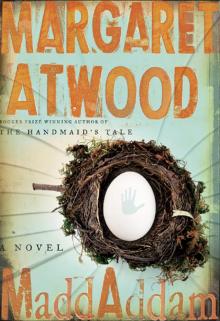 MaddAddam 03 - MaddAddam
MaddAddam 03 - MaddAddam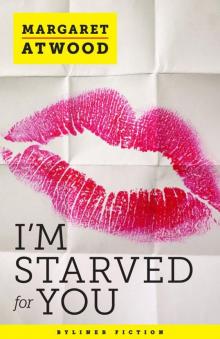 I’m Starved for You (Kindle Single)
I’m Starved for You (Kindle Single) Murder in the Dark
Murder in the Dark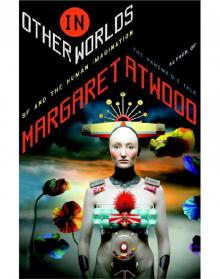 In Other Worlds
In Other Worlds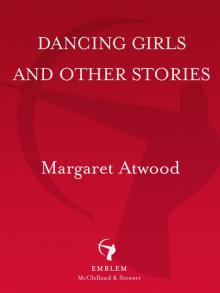 Dancing Girls
Dancing Girls Moral Disorder
Moral Disorder